
Radiation Oncology Journal
Scope & Guideline
Pioneering discoveries in radiation therapy for improved patient outcomes.
Introduction
Aims and Scopes
- Radiation Therapy Techniques and Innovations:
The journal emphasizes the development and evaluation of various radiation therapy techniques, including hypofractionation, stereotactic body radiotherapy, and brachytherapy, fostering advancements in treatment protocols. - Clinical Outcomes and Efficacy Studies:
A core focus is on clinical studies that assess the outcomes and efficacy of radiation therapy across different cancer types, exploring survival rates, toxicity profiles, and patient quality of life. - Integration of Technology in Radiation Oncology:
The journal highlights the role of emerging technologies such as radiomics, AI, and adaptive radiation therapy, aiming to enhance precision in treatment planning and delivery. - Multidisciplinary Approaches in Cancer Treatment:
Research published often explores collaborative approaches involving surgery, chemotherapy, and immunotherapy, underscoring the importance of integrated treatment strategies in managing cancer. - Patient-Centric Research:
The journal prioritizes studies that consider patient experiences, psychological impacts, and the role of patient-reported outcomes in radiation oncology.
Trending and Emerging
- Hypofractionated Radiation Therapy:
There is a significant increase in research exploring hypofractionated radiation therapy, particularly its efficacy and safety across various cancer types, indicating a paradigm shift in treatment protocols. - Integration of Artificial Intelligence and Radiomics:
The incorporation of AI and radiomics into radiation oncology is gaining traction, with studies focusing on predictive modeling and treatment personalization, showcasing the future of precision medicine. - Psychosocial Aspects of Cancer Treatment:
Recent studies emphasize the psychological impacts of radiation therapy on patients, exploring anxiety and quality of life, reflecting a broader understanding of patient care beyond clinical outcomes. - Adaptive Radiotherapy Techniques:
Emerging research on adaptive radiotherapy techniques highlights their role in addressing anatomical changes during treatment, aiming for improved accuracy and patient outcomes. - Combination Therapies with Immunotherapy:
The exploration of combining radiation therapy with immunotherapy is increasingly prominent, addressing the potential synergistic effects to enhance treatment efficacy and improve survival rates.
Declining or Waning
- Traditional Fractionation Schedules:
There seems to be a decline in studies focusing on conventional fractionation schedules as the field increasingly shifts towards hypofractionated and adaptive radiation therapies that offer improved outcomes. - Single Modality Treatments:
Research centered solely on radiation therapy without the integration of other treatment modalities is becoming less common, indicating a trend towards more comprehensive treatment strategies. - Basic Radiobiology Studies:
There is a noticeable reduction in the publication of basic radiobiology studies, as the journal emphasizes clinical applications and outcomes over fundamental research. - Palliative Care Focus:
While still relevant, the volume of papers specifically addressing palliative radiotherapy has diminished, possibly due to a growing emphasis on curative treatment approaches.
Similar Journals

STRAHLENTHERAPIE UND ONKOLOGIE
Transforming patient outcomes with rigorous research.STRAHLENTHERAPIE UND ONKOLOGIE is an esteemed journal published by Springer Heidelberg, focusing on critical advancements and research in the fields of Oncology and Radiology. Established in 1986, this journal has carved its niche within the scientific community, ranking in the Q1 category for Radiology, Nuclear Medicine and Imaging, and Q2 for Oncology as of 2023. With an ISSN of 0179-7158 and E-ISSN 1439-099X, it serves as an essential resource for researchers, professionals, and students dedicated to the complexities of cancer treatment and radiation therapy. While the journal operates under a subscription model, its broad international readership values its rigorous peer-review process and comprehensive coverage of pivotal studies. STRAHLENTHERAPIE UND ONKOLOGIE continues to enhance its impact in the domains of oncology and radiology, as evidenced by its commendable Scopus rankings, including a 76th percentile in Radiology and a 65th percentile in Oncology. Its commitment to disseminating innovative research solidifies its role as a cornerstone in the ongoing quest to improve patient care and therapeutic techniques.
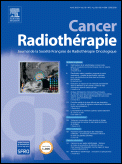
Cancer Radiotherapie
Shaping the future of cancer treatment with cutting-edge radiotherapy studies.Cancer Radiotherapie, published by Elsevier, is a respected academic journal dedicated to advancing the field of oncology and radiology through original research and comprehensive reviews. With an ISSN of 1278-3218 and an E-ISSN of 1769-6658, the journal serves as a vital platform for disseminating knowledge and innovation in cancer treatment methodologies, specifically focusing on radiotherapy. As of 2023, it holds a Category Quartile of Q3 in both Oncology and Radiology, Nuclear Medicine and Imaging, reflecting its significance within these domains amidst a competitive landscape. Despite its current rankings—205th out of 333 in Radiology and 269th out of 404 in Oncology—it continuously strives to build a reputable presence with contributions that push the boundaries of cancer therapy. Although open access options are not available, the journal is committed to ensuring that valuable insights reach healthcare professionals and researchers worldwide, contributing to improved patient outcomes and advancements in treatment efficacy.

Turk Onkoloji Dergisi-Turkish Journal of Oncology
Innovating cancer care with rigorous research and peer-reviewed insights.Turk Onkoloji Dergisi - Turkish Journal of Oncology, published by KARE PUBL, serves as a vital platform in the field of oncology, specifically catering to the Turkish-speaking research community and contributing to global discourse. With an ISSN of 1300-7467, this journal, which has been in circulation since 2007 and continues until 2024, recognizes the importance of advancing medical knowledge in cancer research through rigorous peer-reviewed articles. Although currently positioned in the Q4 category of oncology journals with a Scopus rank of #344 out of 404, the journal is dedicated to fostering significant research insights and innovative perspectives on cancer treatment and prevention. While it does not currently offer open access, its content is essential for professionals, researchers, and students aiming to enhance their understanding of oncology developments in Turkey and beyond. The Turkish Journal of Oncology not only aspires to improve the quality of cancer care but also strives to enhance collaboration among researchers, thereby influencing future oncology practices.

Journal of Contemporary Brachytherapy
Innovating cancer treatment through contemporary brachytherapy research.Journal of Contemporary Brachytherapy, published by TERMEDIA PUBLISHING HOUSE LTD, is a distinguished open-access journal dedicated to advancing the field of brachytherapy within the oncology and radiology domains. Since its inception in 2009, the journal has provided a platform for researchers, clinicians, and students to share innovative findings, cutting-edge techniques, and clinical experiences, contributing significantly to evidence-based practices in cancer treatment. With an ISSN of 1689-832X and E-ISSN 2081-2841, the journal has established its presence globally, and it is indexed in Scopus, achieving a commendable standing among its peers—with rankings of #196 in Radiology, Nuclear Medicine, and Imaging and #260 in Oncology for 2023. Notably, it holds a Q3 quartile classification, reflecting its emerging influence in these critical fields. The journal is committed to open science, ensuring that research is accessible to a wide audience, which is particularly vital for the ongoing development of methodologies and the implementation of best practices in brachytherapy. Exploring topics from the technical aspects of brachytherapy procedures to patient management strategies, the Journal of Contemporary Brachytherapy is an essential resource for those looking to stay at the forefront of oncological advancements.

Advances in Radiation Oncology
Connecting Ideas, Advancing OncologyAdvances in Radiation Oncology, published by Elsevier Inc, is a premier international journal dedicated to the field of oncology and radiology, focusing on the latest groundbreaking research and innovations in radiation therapy. Launched as an Open Access journal in 2016, it has since carved out a significant niche in the academic community, featuring contributions that span a diverse range of topics including clinical practices, technologies, and outcomes in radiation oncology. With an impressive Q2 rankingOncology and Radiology, Nuclear Medicine and Imaging categories for 2023, and positioned within the 65th and 55th percentiles of Scopus ranks, it serves as an essential resource for researchers, medical professionals, and students alike. The journal not only emphasizes the importance of disseminating knowledge widely through its open access model but also aims to foster collaboration and innovation in the evolving landscape of cancer treatment. For those looking to stay at the forefront of radiotherapy research and advancements, Advances in Radiation Oncology is an invaluable platform for scholarly communication.
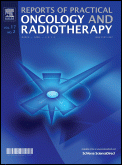
Reports of Practical Oncology and Radiotherapy
Advancing cancer care through open-access research.Reports of Practical Oncology and Radiotherapy is a distinguished open-access journal dedicated to advancing the fields of oncology, radiotherapy, and cancer research. Published by VIA MEDICA since 2001, this journal serves as a critical platform for disseminating innovative research and practical findings that impact clinical practices and patient outcomes. With an emphasis on fostering collaboration and knowledge exchange among researchers, clinicians, and students, the journal has positioned itself within the Q3 and Q4 categories of renowned directories in oncology, radiology, and nuclear medicine as of 2023. Based in Gdansk, Poland, it provides unrestricted access to its articles, ensuring that crucial research reaches a wide audience. This dedication to open access reflects the journal's commitment to transparency and innovation in the fight against cancer, making it an invaluable resource in this vital field of study.

Radiation Oncology
Elevating oncology knowledge for better patient outcomes.Radiation Oncology is a premier scholarly journal published by BMC, dedicated to advancing the field of oncology through innovative research and comprehensive reviews since its inception in 2005. With its Open Access model, the journal ensures that the latest findings in radiotherapy and cancer treatment are accessible to a global audience, fostering collaboration and knowledge sharing among researchers, clinicians, and healthcare professionals. The journal has garnered an impressive reputation with prestigious rankings, achieving Q1 status in Radiology, Nuclear Medicine and Imaging and Q2 in Oncology as of 2023, reflecting its significant impact on the scientific community. In the Scopus rankings, it stands proud at Rank #61 in Radiology, Nuclear Medicine and Imaging, placing it in the top 81st percentile, and Rank #112 in Oncology at the 72nd percentile. With a converged publication plan extending through 2024, Radiation Oncology remains a vital resource for those dedicated to enhancing cancer treatment methodologies and outcomes.
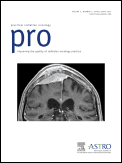
Practical Radiation Oncology
Fostering Excellence in Radiation TherapyPractical Radiation Oncology is a premier journal published by Elsevier Science Inc., focusing on the critically important fields of Oncology and Radiology, Nuclear Medicine, and Imaging. With an ISSN of 1879-8500, this journal serves as an essential resource for professionals and researchers dedicated to advancing the practice and research of radiation oncology. Established in 2011 and continuing through 2024, it has quickly gained recognition, achieving a prestigious Q2 ranking in Oncology and an exceptional Q1 ranking in Radiology, Nuclear Medicine, and Imaging as of 2023. The journal, housed in New York, USA, provides a platform for innovative research and practical insights, aimed at enhancing therapeutic practices and improving patient outcomes. As part of its commitment to fostering scientific dialogue, it also features a range of articles, reviews, and clinical studies that cater to the diverse interests of its readers. Hard-copy availability combined with digital access ensures a broad reach for the latest advancements in the field.
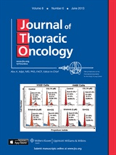
Journal of Thoracic Oncology
Leading the Charge in Thoracic Malignancy InsightsJournal of Thoracic Oncology, published by Elsevier Science Inc, is a premier scholarly outlet dedicated to advancing the field of thoracic oncology. With an impressive impact factor and consistently rated in the Q1 quartile across several pertinent categories such as Medicine, Oncology, and Pulmonary and Respiratory Medicine, this journal stands at the forefront of research dissemination. Covering a broad scope that includes innovative therapeutic approaches, clinical trials, and the molecular underpinnings of thoracic malignancies, the journal serves as a vital resource for researchers, healthcare professionals, and students seeking to enhance their understanding of thoracic cancer and its treatment. With publication dates converging from 2006 to 2024, the Journal of Thoracic Oncology fosters a collaborative scholarly community by providing a platform for high-quality research while ensuring accessibility through traditional publication formats. Positioned in the heart of New York City, this journal not only reflects the cutting-edge advancements in oncology but also plays a pivotal role in shaping the future of thoracic cancer care.
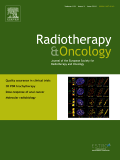
RADIOTHERAPY AND ONCOLOGY
Empowering oncology with innovative radiotherapy insights.Radiotherapy and Oncology is a leading peer-reviewed journal published by Elsevier Ireland Ltd, focusing on the vital fields of hematology, oncology, and radiology. With an impressive impact factor and ranking in the top quartiles (Q1) of its categories as of 2023, it is recognized for disseminating high-quality research that contributes significantly to advancements in cancer treatment and patient care. The journal, which has been in circulation since 1983, aims to provide a platform for original research articles, reviews, and clinical studies that explore the latest innovations in radiotherapeutic technologies and oncology practices. This journal is essential for researchers, healthcare professionals, and students who are dedicated to improving cancer therapies and outcomes. Although it does not offer open access, the wealth of information contained within its pages supports continued education and development in these crucial medical fields.